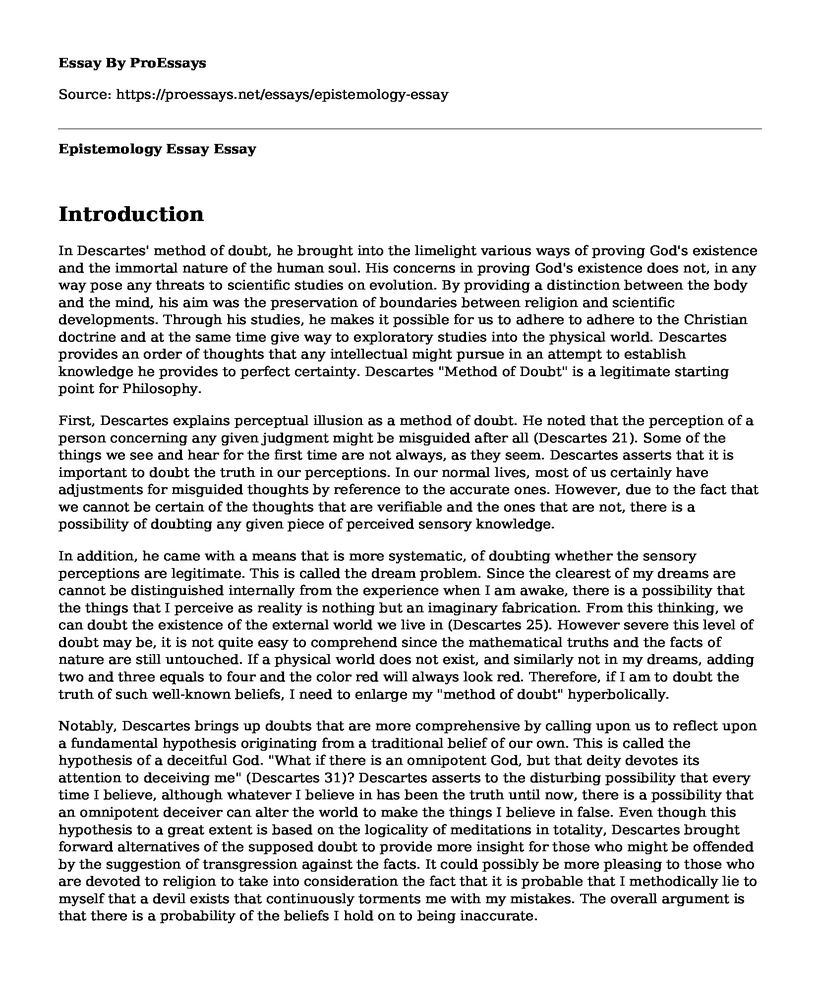Introduction
In Descartes' method of doubt, he brought into the limelight various ways of proving God's existence and the immortal nature of the human soul. His concerns in proving God's existence does not, in any way pose any threats to scientific studies on evolution. By providing a distinction between the body and the mind, his aim was the preservation of boundaries between religion and scientific developments. Through his studies, he makes it possible for us to adhere to adhere to the Christian doctrine and at the same time give way to exploratory studies into the physical world. Descartes provides an order of thoughts that any intellectual might pursue in an attempt to establish knowledge he provides to perfect certainty. Descartes "Method of Doubt" is a legitimate starting point for Philosophy.
First, Descartes explains perceptual illusion as a method of doubt. He noted that the perception of a person concerning any given judgment might be misguided after all (Descartes 21). Some of the things we see and hear for the first time are not always, as they seem. Descartes asserts that it is important to doubt the truth in our perceptions. In our normal lives, most of us certainly have adjustments for misguided thoughts by reference to the accurate ones. However, due to the fact that we cannot be certain of the thoughts that are verifiable and the ones that are not, there is a possibility of doubting any given piece of perceived sensory knowledge.
In addition, he came with a means that is more systematic, of doubting whether the sensory perceptions are legitimate. This is called the dream problem. Since the clearest of my dreams are cannot be distinguished internally from the experience when I am awake, there is a possibility that the things that I perceive as reality is nothing but an imaginary fabrication. From this thinking, we can doubt the existence of the external world we live in (Descartes 25). However severe this level of doubt may be, it is not quite easy to comprehend since the mathematical truths and the facts of nature are still untouched. If a physical world does not exist, and similarly not in my dreams, adding two and three equals to four and the color red will always look red. Therefore, if I am to doubt the truth of such well-known beliefs, I need to enlarge my "method of doubt" hyperbolically.
Notably, Descartes brings up doubts that are more comprehensive by calling upon us to reflect upon a fundamental hypothesis originating from a traditional belief of our own. This is called the hypothesis of a deceitful God. "What if there is an omnipotent God, but that deity devotes its attention to deceiving me" (Descartes 31)? Descartes asserts to the disturbing possibility that every time I believe, although whatever I believe in has been the truth until now, there is a possibility that an omnipotent deceiver can alter the world to make the things I believe in false. Even though this hypothesis to a great extent is based on the logicality of meditations in totality, Descartes brought forward alternatives of the supposed doubt to provide more insight for those who might be offended by the suggestion of transgression against the facts. It could possibly be more pleasing to those who are devoted to religion to take into consideration the fact that it is probable that I methodically lie to myself that a devil exists that continuously torments me with my mistakes. The overall argument is that there is a probability of the beliefs I hold on to being inaccurate.
Conclusion
Therefore, it is clear that Descartes' "Method of Doubt" is an important starting point for people who are interested in philosophy. His arguments on perceptual illusion, the dream problem, and the deceitful God are all very important to disapproving skeptics who doubt the existence of God. He believes that as much as the advancement of science is important, people's religious beliefs should also be held as important and none should interfere with the other. The point of coming up with these proofs was to beat skeptics at a game they started. It is important to appreciate the escape route offered by Descartes for those who are devout.
Works Cited
Descartes, Rene. "Meditations on First Philosophy." Reason and Responsibility: Readings in Some Basic Problems of Philosophy, edited by Joel Feinberg and Russ Shafer-Landau, Wadsworth, 2013.
Cite this page
Epistemology Essay. (2022, Apr 16). Retrieved from https://proessays.net/essays/epistemology-essay
If you are the original author of this essay and no longer wish to have it published on the ProEssays website, please click below to request its removal:
- The Ethics of Police Deception During Interrogation Essay
- What Inspires a Man to Seek to Do Good Instead of Evil? Paper Example
- Deontological Ethics: Kant's Perspective on Morality - Essay Sample
- Achieving the American Dream: Equality for All - Essay Sample
- Identity vs Image: Understanding the Difference - Essay Sample
- Essay Sample on Unethical Prison Experiment: Review of Zimbardo's Application for Approval
- Ethical Issues in Psychological Research - Essay Sample







